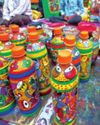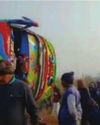
As the Head of the Indian Ocean Tsunami Warning and Mitigation System (IOTWMS) Secretariat based in Perth, Australia, Dr. Kumar has led impactful international initiatives. He has successfully managed large-scale scientific projects involving collaboration with national and international institutions, scientists, and stakeholders. In an exclusive interview with Rahul Gahlawat of The Statesman, Dr Kumar talked about the Intergovernmental Coordination Group for the Indian Ocean Tsunami Warning and Mitigation System.
Q: What was UNESCO's role in setting up the tsunami warning system after the 2004 tsunami?
A: When the devastating tsunami struck on 26 December 2004, there was no tsunami warning system in the Indian Ocean region. This tragic event claimed around 230,000 lives, displaced many more, and caused billions of dollars in economic losses. This prompted the United Nations to mandate UNESCO's Intergovernmental Oceanographic Commission (IOC) in 2005 to establish a system to detect and warn about tsunamis and prepare communities in the region. This system is known as the Indian Ocean Tsunami Warning and Mitigation System (IOTWMS) and functions under the coordination of the Intergovernmental Coordination Group (ICG).
Currently, 27 member states and territories collaborate through this system. Over the past 20 years, efforts under UNESCO's IOC have focused on establishing technical components, setting standards, deploying sensors, and building regional and national tsunami warning frameworks. The system now includes detection and warning mechanisms, data sharing, and a dissemination network to generate and communicate warnings effectively.
This story is from the December 28, 2024 edition of The Statesman.
Start your 7-day Magzter GOLD free trial to access thousands of curated premium stories, and 9,000+ magazines and newspapers.
Already a subscriber ? Sign In
This story is from the December 28, 2024 edition of The Statesman.
Start your 7-day Magzter GOLD free trial to access thousands of curated premium stories, and 9,000+ magazines and newspapers.
Already a subscriber? Sign In
DADIMA TALES
When I was a primary school student, 'Dalmia' brand of glucose biscuits were very popular. They were consumed with tea in middle-class households like ours.

H-1B visas
SIR, I refer to \"H1-B Dilemma\" (January 1). Donald Trump's endorsement of the H1-B visa program amid the debate between Elon Musk and Steve Bannon reflects a calculated yet controversial stance on immigration policy.
Toxic Legacy
Four decades after the catastrophic gas leak that devastated Bhopal, the recent removal of toxic waste from the Union Carbide plant marks a small yet significant step in addressing the lingering fallout of one of the world's worst industrial disasters.
Dense fog paralyses Delhi-NCR, most of North India
North India came to a standstill on Saturday, as intense cold waves and dense fog blanketed the region, causing widespread disruptions.

Nationalistic identity and pride
(An excerpt from 'India's New Right: Powering The Current Wave of Nationalism and Civilisational Revival')

Operation Iron Tempest and the treachery around narcotics
(An excerpt from 'The Nukes, the Jihad, the Hawalas and Crystal Meth')

Paribesh Bandhab Haat: Celebration of tradition and sustainability
Upon entering the Paribesh Bandhab Haat, one is immediately carried away to a different realm of vibrant hues, cheerful faces and a serene atmosphere nestled in the lap of nature.
Two more arrested in Malda TMC leader's murder case
Two more suspects have been arrested in connection with the murder of popular Trinamul Congress leader Babla Sarkar.

Bus from Kolkata topples near Mukutmanipur, 15 injured
A bus carrying picnic revellers from Kolkata toppled near Mukutmanipur, a tourist destination in Bankura this morning, leaving at least 15 injured.
South Bengal Sports Carnival
Soccer star Bhichung Bhutia will lead a marathon with the participants to give a boost to the games